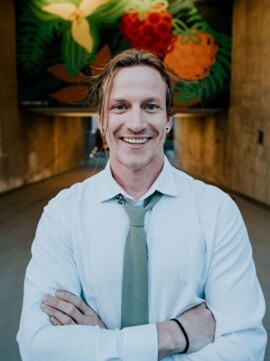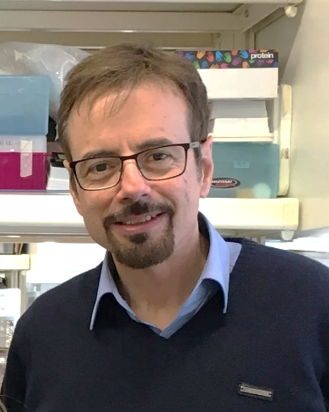Edward Meier

Biography
Edward Meier earned his MSc from the University of Victoria in 2021, specializing in carbohydrate processing of pathogens. Following his postgraduate studies, he dedicated three years to the biopharmaceutical industry, contributing significantly to the advancement of multi-specific T-cell engager, ADC, and radio-conjugate antibody formats for the treatment of diverse cancers and immunological disorders. His scientific pursuits are fueled by a passion for chemistry, biochemistry, and structural biology, which he applies adeptly to address challenges in health and disease. Beyond the confines of the laboratory, Edward finds solace and joy in outdoor activities, such as hiking, biking, traveling, and rock climbing. Additionally, he indulges his creative side through painting, playing guitar and brewing beer, among other hobbies.
Research project objectives
The project focuses on the development of cutting-edge anti-combotope scFv antibodies as part of the GlyCanDrug program. The main objectives include preparation of synthetic combotope peptides, development of the iDEAL phage display antibody discovery platform, molecular-level study of combotope/scFv interactions, specificity assessment and target validation using various engineered cancer cell models and human patient tissue samples. This training will involve understanding the implications of scFv antibodies as potential chimeric antigen receptors to enhance NK cells’ ability to kill cancer cells. This work will contribute to the ambitious studies of the GlyCanDrug program and lay the groundwork for future projects.
Technical University of Denmark (DTU)
Latest DC news
DC5 video
Selected papers:
- Sørensen CV, […], Laustsen AH*. Antibody-dependent enhancement of toxicity of myotoxin II from Bothrops asper. Nature Communications 2023, in press.
- Tulika T, […], Laustsen AH*. Phage display assisted discovery of a pH-dependent anti-α-cobratoxin antibody from a natural variable domain library. Protein Science 2023, 32, p1-17.
- Ledsgaard L, […], Laustsen AH*, Karatt-Vellatt A. Discovery and optimization of a broadly-neutralizing human monoclonal antibody against long-chain α-neurotoxins from snakes. Nature Communications 2023, 14, p1-14.
- Laustsen AH*, […], McCafferty J. In vivo neutralization of dendrotoxin-mediated neurotoxicity of black mamba venom by mixtures of human IgG monoclonal antibodies. Nature Communications 2018, 9: p1-9.
- Persson N, […] Blixt O. Epitope mapping of a new anti-Tn antibody detecting gastric cancer cells. Glycobiology 2017, 27, 635-645. DOI: 10.1093/glycob/cwx033.
- Persson N, […] Blixt O. A Combinatory Antibody-Antigen Microarray Assay for High-Content Screening of Single-Chain Fragment Variable Clones from Recombinant Libraries. PLoS One 2016, 11:e0168761. DOI: 10.1371/journal.pone.0168761.
- Blixt O, […] Filatov AV. Analysis of Tn-antigenicity with a panel of new IgM and IgG1 monoclonal antibodies raised against leukemic cells. Glycobiology. 2012, 22, 529-42.
- Gong Y, Klein Wolterink RGJ, Gulaia V, Cloosen S, Ehlers FAI, Wieten L, Graus YF, Bos GMJ, Germeraad WTV. Defucosylation of tumor-specific humanized anti-MUC1 monoclonal antibody enhances NK cell-mediated anti-tumor cell Cytotoxicity. Cancers, May 2021, 13, 2579.
- Gong Y, Klein Wolterink RJG, Wang JX, Bos GMJ, Germeraad WTV. Generation chimeric antigen receptor Natural Killer cells for tumor immunotherapy. J Hematol Oncol. 2021. 14:73.
- Huijskens MJAJ, Walczak M, Sarkar S, Atrafi F, Senden-Gijsbers BLMG, Bos GMJ, Wieten L, Germeraad WTV. Ascorbic acid promotes proliferation of NK cell populations in culture systems applicable for NK cell therapy. Cytotherapy. 2015 May;17(5):613-20.
- Sarkar S, Germeraad WTV, Rouschop KM, Steeghs EM, van Gelder M, Bos GMJ, Wieten L. Hypoxia induced impairment of NK cell cytotoxicity against multiple myeloma can be overcome by IL-2 activation of the NK cells. PLoS One. 2013 May 28;8(5):e64835.
- Cloosen S, Arnold J, Thio M, Bos GMJ, Kyewski B, and Germeraad WTV. Expression of tumor-associated differentiation antigens CEA and MUC1 glycoforms in human thymic epithelial cells: 2implications for self-tolerance and tumor therapy. Cancer Res. 67(8): 3919-3926, 2007.




